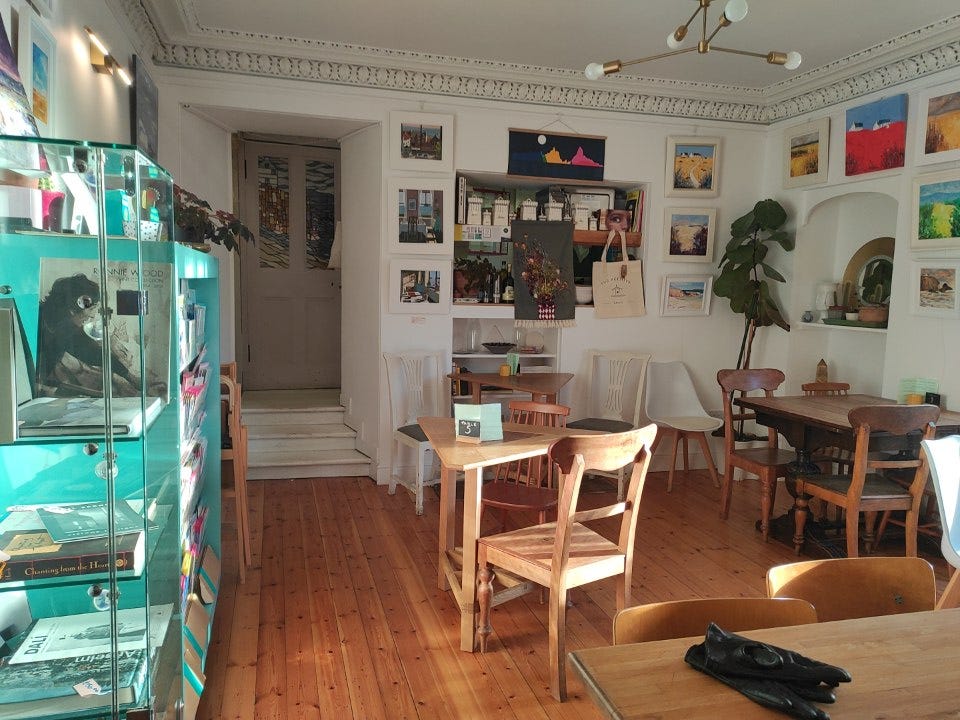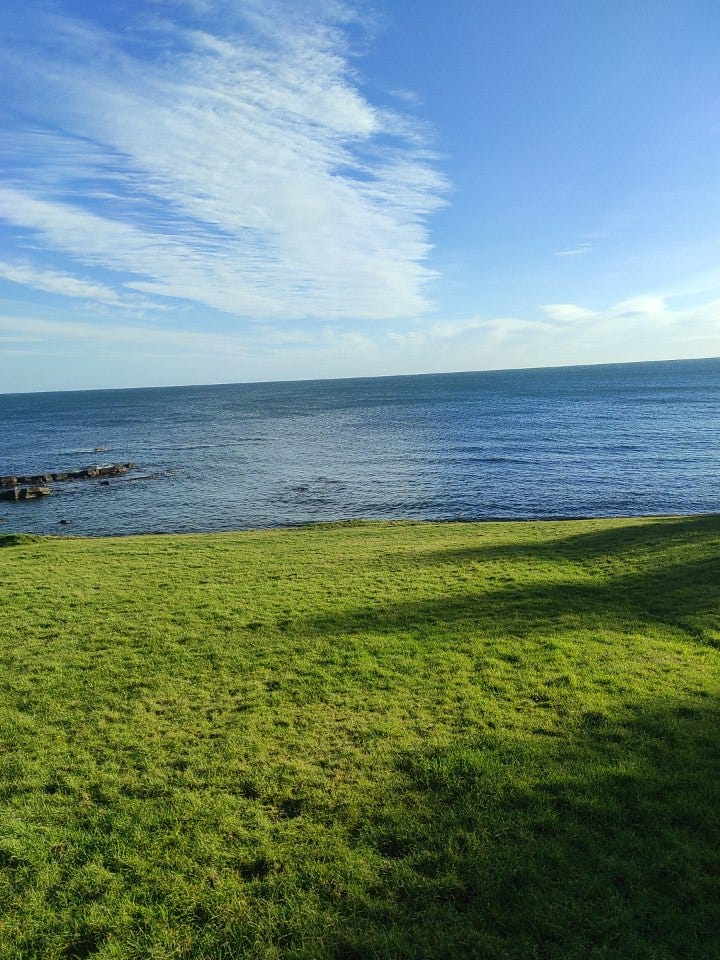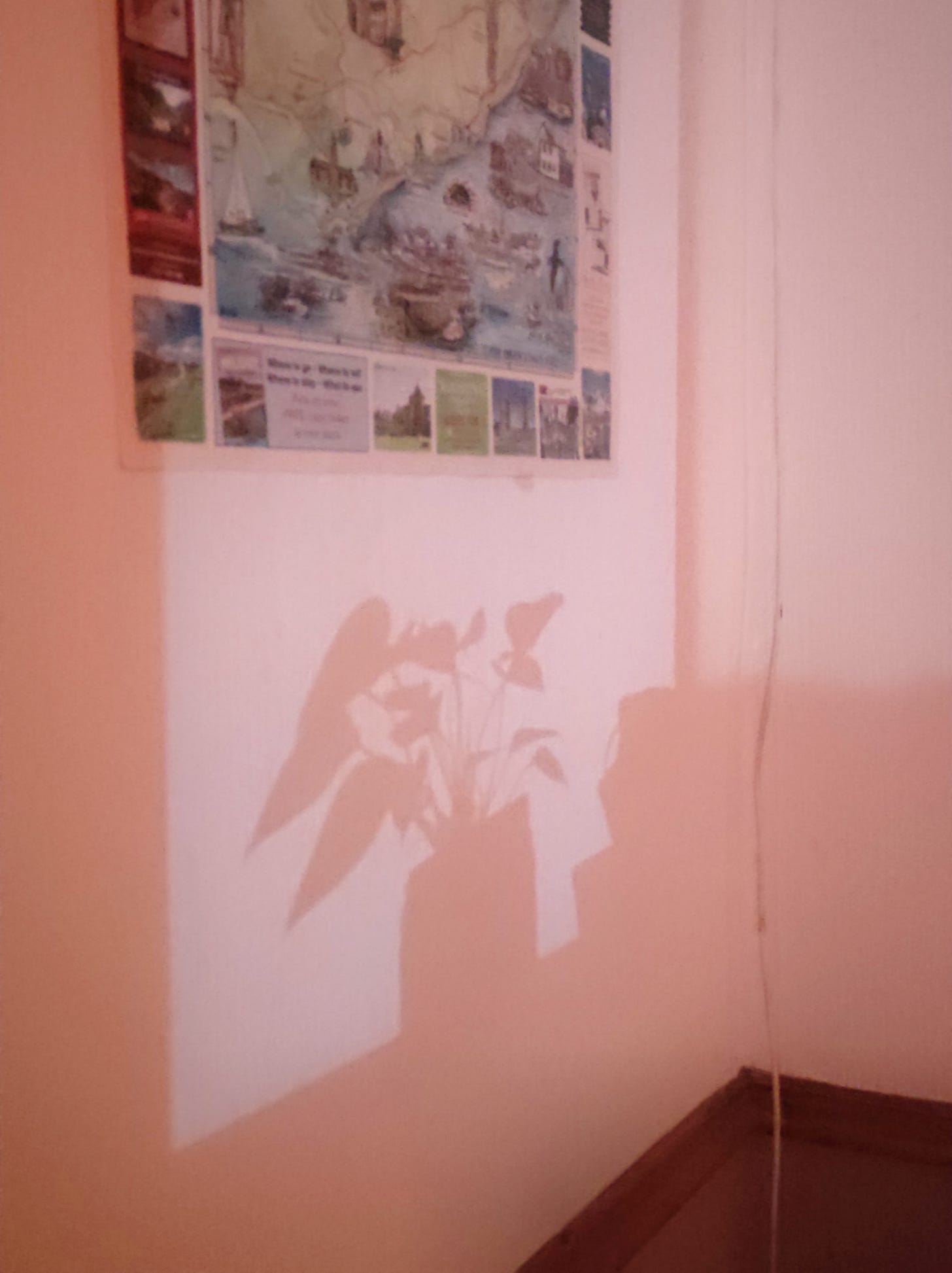On holding on
Scottish Spring, movement, and reading Dorothea Lasky in Crail
Tonight, a friend is hosting a party in St Andrews celebrating the first day of Spring. It seems a bit early for that. The internet tells me Scottish Spring in 2023 is to begin on 20th March, which makes more sense. It’s an interesting time of year, and everyone is moving, everything is shifting — or, at least, readying for a shift. It feels like I am here, stagnant, still, and everything is rushing past me as I hold on to the moment and stretch it out.
There is a poem by Dorothea Lasky that I have memorized over the years, which returns and leaves in phases and seasons, in my mind. I read it two days ago on a sunny afternoon in Crail, a town with a population of less than 1800 people in the Scottish kingdom of Fife. It’s a quiet town, even on the nicest days. I felt at home.
I wanted to tell the veterinary assistant about the cat video Jason sent me
But I resisted for fear she’d think it strange
I am very lonely
Yesterday my boyfriend called me, drunk again
And interspersed between ringing tears and clinginess
He screamed at me with a kind of bitterness
No other human had before to my ears
And told me that I was no good
Well maybe he didn’t mean that
But that is what I heard
When he told me my life was not worthwhile
And my life’s work the work of the elite.
I say I want to save the world but really
I want to write poems all day
I want to rise, write poems, go to sleep,
Write poems in my sleep
Make my dreams poems
Make my body a poem with beautiful clothes
I want my face to be a poem
I have just learned how to apply
Eyeliner to the corners of my eyes to make them appear wide
There is a romantic abandon in me always
I want to feel the dread for others
I can feel it through song
Only through song am I able to sum up so many words into a few
Like when he said I am no good
I am no good
Goodness is not the point anymore
Holding on to things
Now that’s the point
- Ars Poetica, from ‘Black Life’ by Dorothea Lasky
There are many in-betweens in this poem: the image, to begin with, of a dear one’s bittersweet desperate pleas over the telephone. Or the angry, uninviting, harsh words with friends, lovers, and family, in the liminal spaces of an extended argument, where despite our best attempts at avoiding cruelty, we are cruel still. These are in-betweens we struggle to articulate in our work, writing, and conversations; they make us feel guilty, make us feel uncertain in our languages.
But Dorothea is far from uncertain. She writes honestly, and it’s what pulls me to her words. “A kind of bitterness”.
He screamed at me with a kind of bitterness
No other human had before to my ears
And told me that I was no good
Well maybe he didn’t mean that
But that is what I heard
When he told me my life was not worthwhile
And my life’s work the work of the elite.
“A kind of bitterness”, “well maybe he didn’t mean that”, “and my life’s work the work of the elite”: each phrase is a different kind of conversational. I have never met her, I have never hear her voice, or seen her, but I can almost sense Dorothea’s voice in my head as I read this. The punctuations lessen over the course of the poem, but we punctuate them ourselves, relate with Dorothea, feel in these words our own desperation, our own yearning, our calls for confidence and conviction in our work.
My writing and work is a feature in most in-the-middle arguments I have had with loved ones, especially old lovers; questions of whether I can write at all, or whether I should; calls to examine the objects/subjects of my writing; accusations of self-indulgence, grandiose visions, criticisms of poetry’s confessional, the glorification of the self, navel gazing or an empowered narrative.
This part is, in some ways, the ‘middle’ of the in-the-middle arguments — the holding, the standing still, the push back — where you assert identity, respond, hold fast that you are not the sum of your worst parts. This part of the argument is where you tell your dear one(s) who you are, fully aware that they cannot, at that moment, really listen. And they must be dear, for you to be desperate.
Dorothea tells us, the reader, the listener, who she is: we are, for that moment, a witness to her, accompanying her in her in-the-middle conversation, as she spills over.
I say I want to save the world but really
I want to write poems all day
I want to rise, write poems, go to sleep,
Write poems in my sleep
Make my dreams poems
Make my body a poem with beautiful clothes
I want my face to be a poem
I have just learned how to apply
Eyeliner to the corners of my eyes to make them appear wide
In these lines, Dorothea doesn’t shy from centering herself, the significant “I”. Queer me feels in these lines the essences of poetry, why we read it and write it, why we must choose to feel emotions and extend empathy to new situations, where I can wake up happy and warm on a sunny Friday morning and feel only Dorothea’s desperate attempts at preserving herself, knowing herself, on what feels like her Tuesday night. A dear friend once told me of Maya Angelou’s quote: “When people show you who they are, believe them the first time.” Ars Poetica feels to me like an extension of this quote, the poem is alive with feeling. It is, first and foremost, about feeling deeply for things, for people, for places, for memories, to deliberately call to the fore of our heart the difficult emotions.
There is a romantic abandon in me always
I want to feel the dread for others
I can feel it through song
Only through song am I able to sum up so many words into a few
“I want to feel the dread for others / I can feel it through song”. I have read and re-read these lines so many times now. To ask oneself and others the question “what does this really mean?” is only so effective. After a while, the question itself feels meaningless; but what does it mean to want to feel the dread for others? Why? The intentional, deliberate, planned method of feeling - to convert affect into a mode of thought; it’s inexplicable! And why is it so easy to feel through song? I wonder if there is something in a melody that meets an unknown (or at least, unknown to me) evolutionary metric that equates beauty with survivability.
And the last line of this section, which says that only through song can she sum up many words in a few, is just as special. The emphasis when I read these lines is on the so many words, like the words are heavy, like it’s so much that it’s harder to breathe, and singing them makes breathing easier.
I read these lines feeling this weight — I too have so many words. I too want to feel the dread for others. It’s what I, in some ways, consider as caring, to adopt one’s dreams and burdens alike. I read these lines last night, when the silhouette of my year-old anthurium plant (it’s survived the winter) fell upon my bedroom wall below a map of Fife that I’d swiped from a previous apartment.
Reading Dorothea, over and over again, as if the repetition will mean unlocking some deeper realization, some truer meaning, I don’t hesitate to accept my need to hold on to things, I don’t struggle in understanding that this is an important part of who I am. Everyone needs to remember, but many of us choose to let go of memory as it begins to fade; forgetting is healthy, Hannah Arendt reminds us that it is important for forgiveness, friendship, and movement, even if we don’t often call it forgetting. There are visions, colors, textures, and most of all, smells that will disperse through our memory until one day indistinguishable from the rest of the mess. Holding on to things, especially as Autumn turns to Spring, is not always the healthy choice, it is not always good, or about good. But thankfully, goodness doesn’t always matter.
Like when he said I am no good
I am no good
Goodness is not the point anymore
Holding on to things
Now that’s the point
Even now, as difficult as it is most of the time, I remain a fan of holding on: to memories of suffering, so that we may do better in anger than we did before, and to memories of love, so that we may remember how to do better. I do not mind living in the past alongside my time in the future. I do not mind feeling ghostly palms of lost loved ones when I am held by another now. I do not mind channeling the personalities of my extended family when I speak, write, or work. It makes for fewer cruelties, for softer melancholies, and warmer nights.
It’s just like how many of us don’t mind the long Winter and Autumn nights. The darker the nights are, the more we hold on — and holding on, first and foremost, means there’s something, someone, someplace, to hold on to — in stretching the moment out, in repetition, in memory, there’s a new fiction, a different world. We create a space where wholeness is us, just us. Holding on to things is what literature is.
And how tightly can we hold on? Can we, in the best of ways, hold, and be held, tighter? I hope so, I really do. We could all use warmer hugs, longer noontime rests, and easier nights. We can hold on, feel, and move still.




